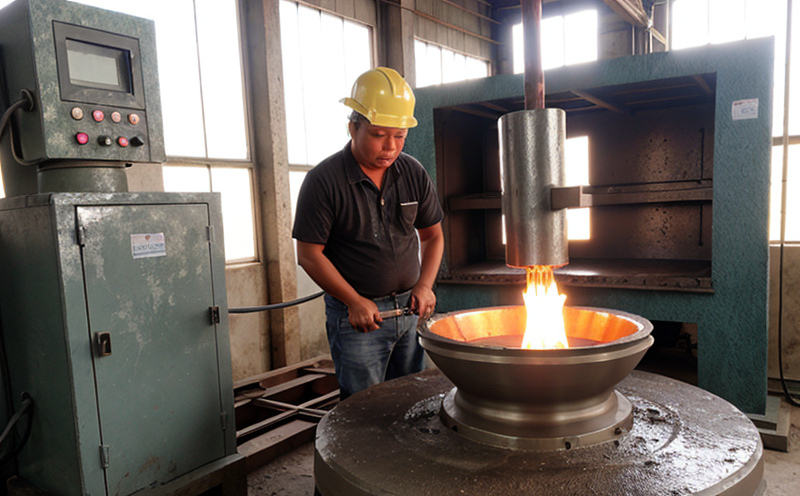ISO 8074 Refractoriness Testing of Foundry Sand
The ISO 8074 standard provides a standardized method to evaluate the refractoriness of foundry sands, which is critical for ensuring the quality and performance of metal casting processes. This testing is essential in the industrial manufacturing sector where precision and reliability are paramount.
Refractoriness refers to the resistance of materials to high temperatures without melting or decomposing. In foundry operations, refractory sands play a vital role as they form the mold that contains molten metal during casting processes. The quality of these sands directly influences the integrity and durability of castings.
The ISO 8074 method involves subjecting samples of foundry sand to specific thermal conditions designed to simulate real-world casting scenarios. During this process, the sample is heated in a controlled environment until it reaches its maximum refractory temperature. The test measures the temperature at which the material begins to show signs of decomposition or loss of physical properties.
This testing procedure ensures that foundry sands meet the required specifications for use in high-temperature applications. Compliance with ISO 8074 not only guarantees product quality but also enhances safety and operational efficiency within industrial manufacturing environments.
The process begins by selecting representative samples of the sand to be tested, ensuring they are free from contaminants that could affect test results. Once selected, these samples undergo rigorous preparation steps including drying to a constant weight at 105°C ± 3°C for 2 hours and sieving according to specified criteria.
The testing apparatus typically consists of a muffle furnace capable of maintaining accurate temperatures within the range required by ISO 8074. A suitable crucible, compatible with the sample size and type, is used for holding the sand during heating. The crucible should be made from materials that do not react chemically or physically with the tested material.
The heating program specified in ISO 8074 involves gradual increases in temperature followed by a stabilization period at each increment until the target temperature is reached. Throughout this process, close monitoring of temperature and visual observation for signs of decomposition are crucial.
Upon completion of the test, detailed documentation of all observed phenomena and measurements is recorded. This includes the initial weight of the sample, final weight after testing, and any other relevant data points such as color changes or structural alterations.
The results from this testing provide valuable insights into the performance characteristics of foundry sands under extreme conditions. By adhering to ISO 8074 standards, manufacturers can ensure consistent quality across batches while minimizing risks associated with poor-quality materials.
This service supports various aspects of industrial manufacturing by providing reliable data that informs decision-making regarding material selection and process optimization. It also helps in maintaining compliance with industry regulations, thereby enhancing overall product reliability and customer satisfaction.
Industry Applications
The ISO 8074 refractoriness testing is widely used across different segments of the industrial manufacturing sector. Foundries that specialize in producing metals like steel, iron, aluminum, and brass rely heavily on this service to maintain optimal casting conditions.
For instance, in steel foundries, accurate knowledge about the refractory properties of sand helps prevent defects such as sticking or warping of castings due to excessive heat. Similarly, aluminum foundries benefit from precise testing because aluminum alloys require very high temperatures during melting and pouring.
In addition to primary metal casting operations, this service extends its utility into secondary processes like core making and pattern production within foundry facilities. Ensuring the right quality of sand contributes significantly towards reducing waste and improving productivity throughout these stages of manufacturing.
Customer Impact and Satisfaction
Adhering to ISO 8074 standards brings tangible benefits for customers who value consistent product performance and reliability. By leveraging our expertise in this area, we help manufacturers achieve higher levels of quality assurance that translate directly into improved customer satisfaction.
Our rigorous testing procedures ensure that only the best-quality foundry sands are used in production processes. This results not only in superior casting outcomes but also contributes to longer-lasting products and reduced downtime associated with rework or scrap losses.
We work closely with our clients throughout every stage of the testing process, from initial consultation through final report delivery. Our team offers valuable insights based on decades of experience working within this field, helping customers make informed decisions that align perfectly with their business goals.
Competitive Advantage and Market Impact
In today’s competitive market environment, maintaining strict adherence to industry standards like ISO 8074 can give your organization a significant edge over competitors who may not prioritize such rigorous quality controls.
By investing in this service, you demonstrate a commitment to excellence that resonates well with both internal stakeholders and external partners. It fosters trust among clients, suppliers, and regulatory bodies alike, positioning your company as an industry leader known for delivering top-notch services consistently.
The ability to deliver reliable testing results aligned with global standards enhances your reputation in the market, making it easier to secure contracts and expand into new territories. Moreover, staying ahead of changing regulations ensures long-term sustainability and resilience against potential disruptions caused by non-compliance issues down the line.





